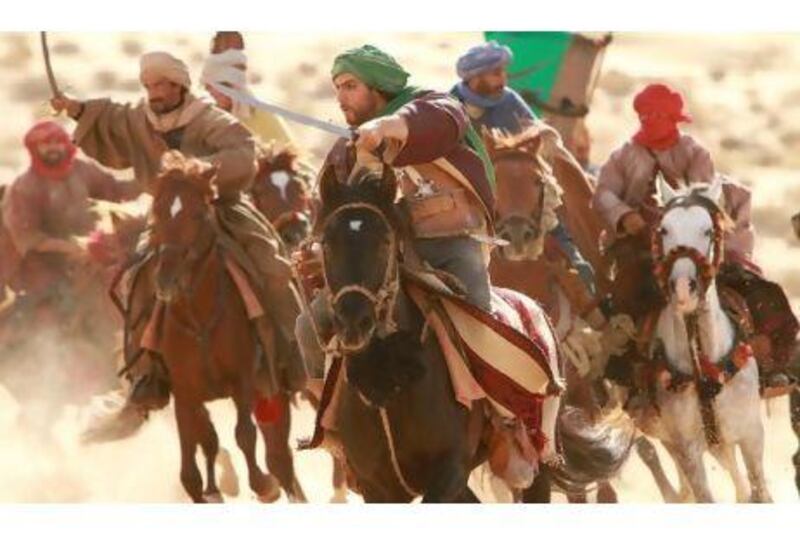Black Gold will open the Doha Tribeca Film Festival tomorrow and it couldn't be more appropriate, writes Alex Ritman
Long before the schedulers sat down to coordinate the programme of the Doha Tribeca Film Festival, it was already obvious which film would be the headline act. When filming for Black Gold wrapped up in March, it was clear the stage had been set well in advance for this to be given its world premiere at the Katara Cultural Village in October. And never has there been a more fitting film to open a film festival from the Gulf.
Described as the biggest Arabian epic since Lawrence of Arabia, Black Gold is the adaptation of Hans Ruesch's 1957 novel The Great Thirst, and tells the fictitious story of the Arab peninsula just as oil was discovered in the 1930s. A dynamic young Arab prince (Tahar Rahim) finds his allegiance torn between two rival emirs: one his conservative father (Mark Strong) and the other his modern, more liberal father-in-law (Antonio Banderas). Tradition and progress collide, with horses, camels, tanks and planes deployed in mighty battles across the sand dunes. There's even time for a spot of royal romance (courtesy of Freida Pinto).
But for Doha, Black Gold is the latest pinnacle of achievement in its fledgling film industry. Not only was it the first major international feature co-produced by the Doha Film Institute (DFI), which contributed to its US$55 million (Dh202m) budget, but the film was partly shot in Qatar, and the vast sand dunes near Mesaieed were perfect for some of the battle scenes.
Fitting in with the efforts to nurture local talent, Qataris featured in front of and behind the cameras during the production, picking up invaluable on-set experience. Even the film's opening music was sung by a Qatari, Fahad Al Kubaisi, who recorded it with James Horner in London's Abbey Road Studios. There's more than one reason Doha is looking forward to the opening ceremony of the festival tomorrow night.
"It has been a very exciting project from day one," says the white-haired man in the director's chair, Jean-Jacques Annaud (Enemy at the Gates, The Name of the Rose), who will be in Doha to watch the premiere. "What was a real privilege for me was to do such a large-scale movie on the Arab world, which is a subject matter that is uncommon in international films unless it is about contemporary events."
And to help create this Arabian adventure, Annaud assembled a cast from across the region and beyond. In Tahar Rahim, the French-Algerian actor who rose to prominence in 2009's award-winning Un Prophèt, he has a lead with strong connections to the Muslim world. "There's something in his behaviour, something in the way he relates to things. It was very easy for Tahar," says Annaud.
With Antonio Banderas, Annaud says the Spanish actor is convinced of his Arabian origin, having been born in Andalusia, which was under Islamic rule until the late 1400s. "He's absolutely serious about it," says Annaud.
The British actor Mark Strong may not have such ties, but so convincing was his portrayal of a Jordanian intelligence chief in Body of Lies that Tarak Ben Ammar, Black Gold's producer, was sure he was from the region.
It was actually Ben Ammar, the Tunisian film producer and all-round media tycoon (his Quinta Communications is also a co-producer alongside DFI), who first wanted to see Black Gold on the cinema screen. He first optioned The Great Thirst more than 30 years ago, but it was put on indefinite hold after he failed to find support from Arab countries. When Annaud was attached to another film set in the region, Shores of Tripoli (which never came to production), Ben Ammar gave him the book to better understand the landscape. "I called him a few days later and said I thought it could be a great movie."
Although the links with Qatar make Black Gold the perfect choice to open this year's Doha Tribeca Film Festival tomorrow night, there's a poignancy that could never have been imagined when development on the film began. Before the cast and crew descended upon the Gulf, the filming took place in Tunisia, in Ben Ammar's Empire Studios about 60 kilometres from Tunis. Annaud and his team were only halfway through production there when the Jasmine Revolution erupted in January, lighting the Arab Spring.
"What was fascinating was that the outside world was almost mirroring the feelings of the movie. There was an extraordinary feeling that we were shooting a movie about that world, and that world was changing at the same time along some of the same issues that we were debating in the movie."
Although Annaud says he could see that the revolution offered no threat to his team, the crew were flown back to Europe. That said, production was only put back by a couple of days, hindered by the government-enforced curfews. "But I stayed and so did Frieda Pinto," he says. "We felt that we couldn't leave such an important moment that was so meaningful to all the Tunisian people on our set."
And the Jasmine Revolution helped underline Annaud and Ben Ammar's belief in a film about a region previously ignored by Hollywood. "It wasn't obvious to finance such a movie," he says. "The Arab world is virtually unknown and there is a sheeplike attitude in our industry where people only want to do the same sorts of movies. Suddenly, our conviction that it was a fascinating world that had to be better known was becoming the reality around us. That was very rewarding."





